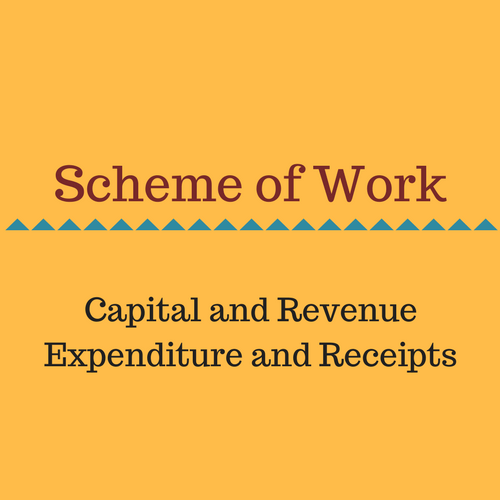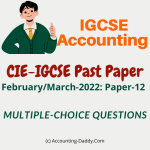|
|
Capital and Revenue Expenditure Resources for Educators

Capital and Revenue Expenditure Resources includes the scheme of work for this topic.
This Scheme of Work outlines the useful resources, activities and assessment strategies to achieve the learning aims and objectives of this topic.
Capital and Revenue Expenditure Resources also includes "past paper question listing" for this topic.
Past paper question listing helps the educators and students to understand the style and depth of the assessment. Accounting-Daddy.com suggests the students to refer this part of Capital and Revenue Expenditure Resources to score higher marks in the CIE Examinations.
Capital and Revenue Expenditure and Receipts - Scheme of Work
|
Suggested prior knowledge: |
To comprehend this topic and to achieve the learning objectives successfully, students should have the previous knowledge of the following areas:
|
|
Context: |
To get the most truthful picture of the financial position of the business, it is essential to classify Expenditure and Receipts accurately. |
|
Teaching time: |
Cambridge recommends three hours of teaching time for this topic. Depending on students’ standard and learning activities planned, it may be extended to three and half hours. |
|
Syllabus reference: |
Cambridge O Level - Principles of Accounts (7110): 6.2 Accounting procedures - 6.2.1 Capital and revenue expenditure and receipts. Cambridge IGCSE – Accounting (0452): 6.4 Accounting procedures - 6.4.1 Capital and revenue expenditure and receipts |
|
Learning objectives: |
Students should be able to: Define the meaning of Capital Expenditure, Revenue Expenditure, Capital Receipts and Revenue Receipts. Distinguish between Capital and Revenue Expenditure; Capital and Revenue Receipts. Account for Capital and Revenue Expenditure, Capital and Revenue Receipts. Calculate and comment on the effect on profit and asset valuation of the incorrect treatment of capital and/or revenue expenditure and capital and/or revenue receipts. |
|
Suggested teaching activities: |
Explain the definitions of Capital Expenditure, Revenue Expenditure, Capital Receipts and Revenue Receipts with suitable examples taken from the surrounding environment. Eg. Take your school as an example. Explain school property and computers in the ICT lab as Capital expenditure. Whiteboard markers, worksheets to the students and salaries to the teachers as Revenue expenditure. School fee collected from the students as Revenue Receipts. Grants received from the local government body for the improvement of the school library as Capital Receipt. Divide the students into group of four. Select different business establishments which are very familiar to all the students, such as a bookstore, a grocery store, a local market which they often visit for various purposes and ask each group to list capital and revenue expenditure and capital and revenue receipts which may occur within that selected business. Select students randomly, and a give a transaction of Capital Expenditure or Revenue Expenditure or Capital Receipts or Revenue Receipts to classify. Explain the effect of incorrect treatment of Capital and Revenue Expenditure and Receipts on Profit for the year and Asset valuation in the Statement of Financial Position. Prepare worksheets based on past paper questions and ask students to practice given worksheets at home. Capital and Revenue Expenditure resources section of this website provides list of past paper questions for this topic. Take students to the ICT Lab in the school and conduct an online surprise test using interactive quizzes at www.accounting-daddy.com |
|
Learning resources: |
Offline resources: Business Accounting, Volume 1, 13th Edition by Alan Sangster and Frank Wood, ISBN10: 1292084669 /ISBN13: 9781292084664 Business Accounting: Multiple-Choice Question Book, by Tommy Robinson and Frank Wood, ISBN 027364193X, 9780273641933. Cambridge O Level Principles of Accounts, Authored by Catherine Coucom, ISBN 978-1-107-60478-0 IGCSE and O Level Accounting, Authored by Catherine Coucom, ISBN 978 0521 72001 4. IGCSE and O Level Accounting Workbook, Authored by Catherine Coucom, ISBN 10: 0521144159/ISBN 13: 9780521144155 Online resource: www.accounting-daddy.com |
Disclaimer: This scheme of work has been drafted loosely based on CIE Scheme of Work. For original CIE version. Click here!
Learning Corner ::::: Click here to learn how to write a Scheme of Work effectively!
Capital and Revenue Expenditure Resources :
Capital and Revenue Expenditure and Receipts - Past paper question listing:
CIE Past Paper questions from "Capital and Revenue expenditure and receipts"
CIE Syllabus reference: Cambridge O Level - Principles of Accounts (7110):
6.2 Accounting procedures - 6.2.1 Capital and revenue expenditure and receipts.
- Oct/Nov 2016 - Paper 7110/22 - Q.No-2 (c,d)
- Oct/Nov 2015 - Paper 7110/21 - Q.No-1 (d,e)
- Oct/Nov 2014 - Paper 7110/22 - Q.No-2 (f)
- Oct/Nov2014 - Paper 7110/21 - Q.No-2 (f)
- May/June 2013 - Paper 7110/22 - Q.No-1 (e,f)
- May/June 2013 - Paper 7110/21 - Q.No-1 (e,f,g)
- May/June 2011 - Paper 7110/22 - Q.No-2 (f)
- Oct/Nov 2010 - Paper 7110/22 - Q.No-3 (g,h)
- May/June 2010 - Paper 7110/21 - Q.No-2 (f)
- May/June 2008 - Paper 7110/2 - Q.No-2 (a,b,c)
- May/June 2006 - Paper 7110/2 - Q.No-4
- Oct/Nov 2004 - Paper 7110/2 - Q.No-2
|
|





New! Comments
Have your say about what you just read! Leave us a comment in the box below.